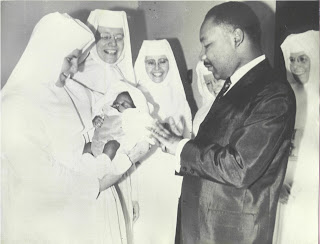 |
| Srs Josepha Twomey, Dorothy Quinn, Mary Weaver, Margaret Isabelle Tracy, and Mary Paul Geck with Dr. Martin Luther King, Jr. at Good Samaritan Hospital in Selma, AL. 1965 |
Dear Friends,
This
weekend, during a raging pandemic and palpable national disunity, we honor the
life and legacy of Martin Luther King Jr., a visionary whose leadership was
rooted in the Gospel. It seems right that today, we should also honor John
Lewis, who internalized the Gospel and its message together with MLK. Congressman
John Lewis died on July 17, 2021.
The
core of the vision of both King and Lewis was the “Beloved Community,” and
that’s where we linger today. The Beloved Community in their lives and in ours.
“You live as if you are already there, that you’re already in that community, part of that sense of one family, one house. If you visualize it, if you can even have faith that it is there, for you, it is already there.” (John Lewis)
King
and Lewis name the Beloved Community as the overarching framework of the Civil
Rights Movement. Coretta Scott King speaks of it in wider terms: “The Beloved
Community is a state of mind and heart, a spirit of hope – goodwill that
transcends all boundaries and barriers and embraces all creation. At its core,
the Beloved Community is the engine of reconciliation.”
Somewhere
is this collection of insights, we can find ourselves. How do we name and
experience the Beloved Community in our lives? I hope that we can recognize the
Beloved Community as the Reign of God, the Kingdom of God or as other contemporaries
say, the ”Kin”dom of God. Like John Lewis, we are already there but don’t
allude to it. And for Catholic Christians, the road to the Beloved Community
goes through the Church.
That’s
a cultivated awareness. It’s a realization that we must work at developing.
It’s so easy to go to Sunday Eucharist alone, or with our families. We
recognize and even sit near friends and neighbors. But everyone there at any
given Mass belongs to us and we to them. We might not agree with their
political or social values. We might like their tattoos or purple hair. But we
are one with them. We are together the Body of Christ, and that is more than a
saying. We also belong to the Catholic Christians of Vietnam, South Sudan and
Belize… every place around the world where the Baptismal waters have cast us
into the same stream, making its way toward the ultimate unity of all people,
all creation with God.
It’s a
fact that less American Catholics are participating in Sunday Eucharist now
than in prior decades. People slip out of the pews as if no one will miss their
presence – as if no one knew they were there or even cares. And here’s the
awful part. Perhaps we didn’t notice their presence or their absence. Or
perhaps we are the ones who have slipped away and no one seemed to notice. The
Beloved Community loses so much when this happens. Our work as believers is to
encourage one another to be actively engaged as the Beloved Community.
Coretta
Scott King named reconciliation as the necessary ingredient for the Beloved
Community to thrive and reach its destination. Catholics seem to depend almost
exclusively on the gift of reconciliation as coming from the priests and
bishops exclusively, but reconciliation is the gift of believers to one another
in the flow toward unity with God and all creation. It is a right and a
privilege and a responsibility to reach out to one another, and say welcome
home or I’m here and glad to be back.
So
today, let’s honor Martin Luther King Jr, and his leadership towards racial justice
and equality.
Let’s honor John Lewis by making
good trouble as he encouraged us to do. Let’s honor the faith that is in ourselves
and others.
